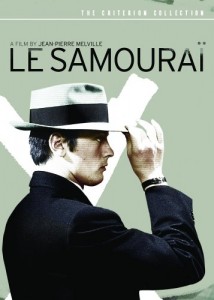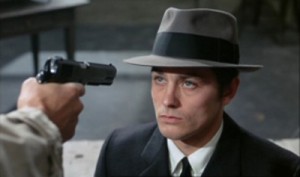So I recently watched Melville’s “masterpiece” LE SAMOURAI, a film about a hit-man in France that is either “betrayed” or caught or something while performing a hit. His plans go askew, and he has to avoid the cops for a while, not only reconfiguring his alibis but also snaking his way out of a suspect line up by doing seemingly nothing. He eventually is pursued through the city streets by the police, also while dealing with his untrustworthy employers and a couple of lovely dames. Although, as an unusual turn for the crime drama with the noir-ish anti-hero, he never calls them “dames”, let alone anything I can remember.
Please be sure to read more under the cut, or go to our forums thread to join in the discussion!
Apparently the main character, the emotionally contained and perfection-centered Jeff Costello, is something of an icon to the cinema that followed, but I had not yet heard his name. Regardless, he is a figure worth appreciating as I’m sure he set a standard for the emotionless hitman (see: Leon, et al) similar to Eastwood’s not-so-nice-cowboy Man With No Name. As far as minimalism goes he doesn’t have much to do with the role but still merits a character of some fascination.
In the meantime he meets a bunch of characters, there is very little dialogue, and everything is meticulously, though not artistically shot. It’s film grammar at its most basic, a term many refer to as “minimalistic.” I refer to it as boring, even for someone who created the French New Wave– a film style I typically despise–and is seemingly going against all the noisy nonsense of someone like the more well-known Godard. If this movie was made by him, it would have been called “Breathless” and it would have sucked. As it stands, it merely takes a while to reach full temperature, never really getting cooked but always simmering. You have to keep an eye on it, even when it looks like it isn’t doing anything.
Granted, there is something worth watching in this movie: The acting is brilliant. Not a single line is wasted by a single character and the look in every pair of eyes holds a deeper meaning than face value. Further, some shots are so well framed they could be eternally iconic photographs of statements on different human emotions, such as authoritarian frustration, lust built on curiosity, or even a complete lack of catharsis. When edited together they tell a very A-to-B story, but on their own many shots tell something far more noteworthy– a moment in time, as films are supposed to do.
The star, still-active Alain Delon, is probably one of my new favorite faces, as he has a face practically carved for the camera. There is dimension and gravitas to how he simply moves (or doesn’t move) his eyes in ways I’ve only seen in the likes of Christopher Walken or…bing time is up I couldn’t think of anyone else off the top of my head. He’s really just that interesting to watch. If nothing else, even when I was most bored with this film, the look on Delon’s face kept me watching, almost just out of the desire to see his emotions change! It’s a shame Melville didn’t keep his original ending gestus. I think that’s probably one of the greatest robberies of cinematic history.
So while the movie has sparse action and little actual dialogue about honor codes or morality, we do see some of it through just the main character’s behaviors. I really can say this is practically a silent film with the exception of a few scenes (and music), but it is also a graceful film that does its best to carry its audience moment-to-moment through actual momentum.
I’ll want to watch this movie again for the ace-camerawork involved, because there are some really breakthrough moments in dolly and tripod work that I think a lot of steadycamers in this day and age should pay attention to. People don’t walk around to look at things- they pivot and pedestal. I think this movie explains a lot about how people typically behave, or could behave, in this kind of situation–the smart ones would keep their mouths shut and their eyes open. Its funny, because I wish the average movie going audience would do the same.
In the end, I will watch this movie again, some day. I recommend any film buff gives it a view, but anyone looking for action or swordplay or any sort of intense sequence of violence not put this in your DvD player. Just because it’s called “Le Samourai” doesn’t mean it’s about anything its strange title might suggest. Let’s just finish off the review by putting it this way– this is one of those movies where the title is, thankfully, never spoken.

